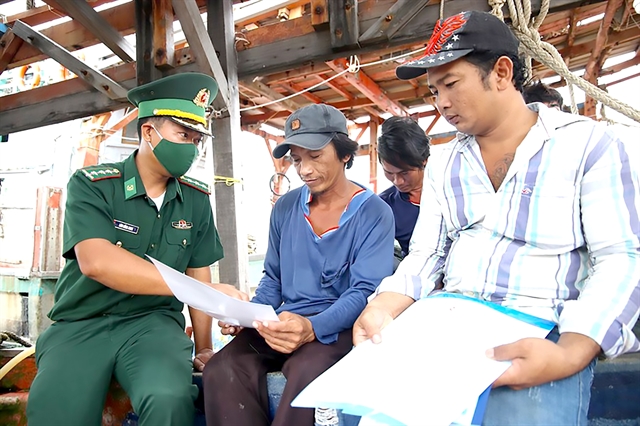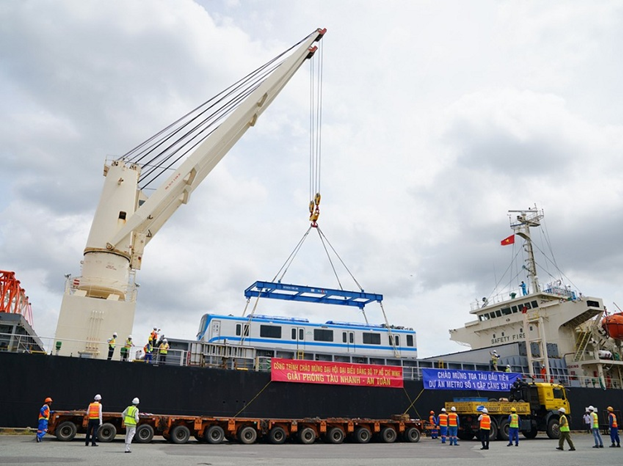 Society
Society

 |
| A soldier from the Tây Yên Border Station gives local fishermen information about illegal, unreported and unregulated fishing. — Photo hanoimoi.vn |
HÀ NỘI — People live in the southwestern border region of Việt Nam always talk about the border guards with love and respect.
The soldiers have supported hundreds of children to study and helped dozens of poor households to have safe place to settle down.
Those acts of kindness have contributed to strengthening the bond between the soldiers and people in border areas.
Nguyễn Văn Xuyên is a fisherman in Kiên Giang southern province.
His fishing boat has 15 crew members.
“When fishing at sea, we are never alone. We always have the care and protection of the soldiers from the Tây Yên Border Station. The soldiers help us update our knowledge of new laws and regulations related to offshore fishing activities,” said Xuyên.
Located in an area with many estuaries, the Tây Yên Border Station directly manages 837 fishing boats and controls 2,942 others that regularly pass through.
According to the schedule, soldiers of the station maintain patrols at least twice a week and increase the frequency during main campaigns to promptly detect and handle violations and especially prevent violations of illegal, unreported and unregulated (IUU) fishing.
Lieutenant colonel Bùi Khắc Dương, head of the station, told the Hà Nội Mới (New Hà Nội) newspaper that the station regularly gave necessary information so that fishing boat owners, captains and fishermen know the laws on fishing.
The fishermen are committed to legally catch seafood.
“Through education, most ship owners and fishermen understand regulations on IUU fishing, thereby minimising violations,” he said.
Fisherman Xuyên said: “Intentionally fishing outside Việt Nam's territorial waters not only violates the law but also brings many risks. Fishermen can still live well on our own fishing areas.”
Xuyên’s fishing boat sails three times a year, earning a total of VNĐ13-16 billion (US$551,500-678,200).
Excluding expenses, the rest is divided among the crew members. Each person is about VNĐ100-130 million ($4,200-5,500), thus the average income is VNĐ10 million ($420) per person per month.
Border guards’ loudspeaker
People in Tân Ân and Viên An Đông communes and Rạch Gốc Town in Ngọc Hiển District, the southern province of Cà Mau are familiar with the image of border guards using portable loudspeakers to broadcast the Party's guidelines and policies, State laws and local regulations.
That is the model of the Cà Mau Border Station.
With a portable loudspeaker, a USB with installed content, and a motorcycle, border guards drive along every alley to convey the necessary information.
Second lieutenant Lưu Nguyễn Minh Đương, a soldier from the station, said that the loudspeakers broadcasts don’t have a set schedule and the information is usually given when many fishermen are ashore or on market days and holidays.
“Educating by loudspeaker in one or two days, local residents cannot remember. But when the work is done for many days, they will gradually understand and firmly obey the laws,” he said.
Chairwoman of the Tân Ân Commune Women's Union Hứa Minh Quang said: "Thanks to the border guards, people often have access to news and announcements of the locality. They have knowledge about the laws, maintaining political security, social order and safety in the commune."
People’s solid support
Lieutenant colonel Danh Tâm of the Phú Mỹ Border Station under the Kiên Giang Province Border Guards, said that the station managed Phú Mỹ and Phú Lợi communes in Giang Thành District.
The two communes have 2,787 households with 9,318 people, of which Khmer people account for over 40 per cent.
Local people’s life still faces many difficulties.
They keep backward customs and habits, have limited ability to apply science and technology to production.
To help the people develop their economy and improve their living standards, over the years, the Phú Mỹ Border Station have closely coordinated with local authorities in poverty reduction work.
They gave free medical examinations and medicine deliveries and distributed 900 gifts to families with meritorious services to the nation, poor, near-poor households and Khmer households.
Projects that help poor students to go to schools are highly appreciated by the people and the locality.
“During border patrol and inspection, we visit and encourage households, creating closeness between border guards and the people. The people trust and love us. They have provided us with hundreds of valuable information for the fight against smuggling and commercial fraud,” Tâm said.
Talking about the work of soldiers of the Phú Mỹ Border Station, Danh Hương, who lives in Tà Teng Village, added: "We are always taken care of, children are awarded scholarships. The students are also given bicycles for going to school. We are very happy and love the soldiers.” — VNS




